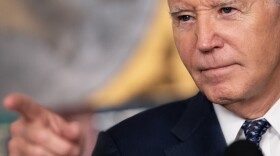
Leah Donnella
Leah Donnella is an editor on NPR's Code Switch team, where she helps produce and edit for the Code Switch podcast, blog, and newsletter. She created the "Ask Code Switch" series, where members of the team respond to listener questions about how race, identity, and culture come up in everyday life.
Donnella originally came to NPR in September 2015 as an intern for Code Switch. Prior to that, she was a summer intern at WHYY's Public Media Commons, where she helped teach high school students the ins and outs of journalism and film-making. She spent a lot of time out in the hot Philly sun tracking down unsuspecting tourists for on-the-street interviews. She also worked at the University of Pennsylvania in the department of College Houses and Academic Resources.
Donnella graduated from Pomona College with a Bachelor of Arts in Africana Studies.
-
Even as a young child, I could understand the idea that words have meaning, which is why when Sen. Lindsey Graham referred to a "lynch mob" coming after Matt Gaetz, I felt my stomach drop.
-
Code Switch weighs in on preparing for difficult political conversations and when to draw the line and uninvite yourself from that family potluck.
-
Michael Vargas Arango helps educate people about what it really means to live with a rare, stigmatized and widely misunderstood mental health condition.
-
As Kamala Harris nears the Democratic party’s nomination, the mood around her candidacy seems less breathless than in 2008. Code Switch digs into what a Black president would mean this time.
-
Given all the heavy news swirling around these past few weeks, we wanted to try to bring the temperature down a little. So here it is: drinks to help you cool down.
-
At the height of the racial reckoning, a school district in Virginia voted to rename two schools that had been previously named for Confederate generals. This month, that decision was reversed.
-
Jerry Seinfeld has the become the latest in a string of public figures to blame "political correctness" for the death of comedy (among other societal ills). But what does the term actually refer to?
-
Recently, conversation about the age of the 2024 presidential candidates has risen to a fever pitch. That's the sign of a deeper problem with how our culture views aging.
-
One in five Black Americans are either immigrants or the children of immigrants. But feeling embraced or understood by the U.S. can seem daunting for some, and impossible for others.
-
Being able to drive makes life easier. It can open up job opportunities. But it also has challenges, especially if there's a language barrier. And traffic stops can be especially high stakes.










